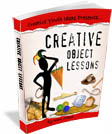Our words can be words of life or words of destruction. This object Lesson for youth reminds us that the words we say have influence beyond just the moment. Also make a great Children’s sermon.
Materials
- Two clear glasses as nearly alike as possible
- A Bottle of red and a bottle of black food coloring
Preparation
- The bottles of food coloring should be covered with white paper
- On one print the words, “Good Influence”
- On the other print the words, “Bad Influence”
- Paste the label “Good Influence” on the bottle with red food coloring
- Paste the label “Bad Influence” on the bottle with the black food coloring
What to Do
- Place the glasses in the center of the room or where the youth can clearly see them.
- Fill the glasses nearly full of water.
- Have the youth define “influence”
- Share the idea that every one has an influence for either good or bad; that we must guard ourselves every moment, for some thoughtless word or act might spoil another’s life.
- Share some personal examples of influence you have had for bad and good.
- Ask the youth to share some things that could be considered a good influence.
- Ask the youth to share some things that could be considered bad influence.
- Ask the youth to share some things they have personally done or said that influenced someone else.
- Ask “How much influence it takes to make a difference?”
- Put one drop of black ink into one of the glasses. The youth will notice with remarkable interest how quickly the color spreads’ and the pure water in the dish is spoiled.
- Emphasize how one drop will spread till it spoils the whole and how one little bad act may spread in the heart of another till a whole life is spoiled.
- Ask one of the youth to take that drop out of the water; they will tell you it cannot be done. And so with our influence, it cannot be undone.
- Put a drop of the red ink in the other glass and the bright color will grow and spread in the same way, and liken this to good influence.
Take it to the Next Level
Make it Spiritual
We can be a positive influence as Christians
- Youth can be a positive influence on other believers (1 Timothy 4:12)
- Believers can be a positive influence on youth (Titus 2:6-8)
- A godly person can be a positive influence an a spouse (1 Peter 3:1-7)
- A Christian can be a positive influence upon the ungodly (1 Peter 2:11-12, 1 Pet 3:1-2; 2:11-12; 1 Thessalonians 1:8-10)
- A Christian can be a positive influence through encouragement (2 Corinthians 9:1-2; Hebrew 10:24-25)
We can be a negative influence as Christians
- Our sin can negatively influence other Christians to also sin (Galations 2:11-13)
- Our sin can negatively influence unbelievers to reject God (Romans 2:24; 1 Timothy 6:1; Titus 2:5)
- False teaching can lead others to error (Galatians 5:7-9; 2 Timothy 2:14)
- Other verses: 1 Corinthians 5:6-8; 8:10-13; 2 Timothy 2:16-18
Youth can be a positive influence by sharing the gospel with others (Romans 1:16; Colossians 1:3-6)
- The gospel has the power to change the mind (Ephesians 4:20-23)
- The gospel has the power to change our conduct (Ephesians 4:24; 5:8-10)
- The gospel has the power to change spiritual condition – death to life (2 Timothy 1:10)
- The gospel has the power to turn darkness into light (2 Corinthians 4:4)
Make it Personal
- What difficulties do we face in trying to be a positive, Christ-like examples to others? In the home? Church? Workplace? Community, with non Christian friends?
- If you were the only Christian someone knew, what picture of a Christian would they have? How would they define a Christian? What would they believe about Christians? What would they expect Christians to do and say?
- How does the answer to these questions above differ from the Biblical idea of what a Christian is supposed to be?
Make it Practical
- Are there parts of your life that you would not want others to imitate? explain?
- What will you do to change? Who will you ask to help you?
- How can you get started this week to be a more positive influence for Christ?
Close by brainstorming ways that youth can be a positive influence this week on their families, friends, and others.
Additional Scriptures
“Don’t let anyone look down on you because you are young, but set an example for the believers in speech, in conduct, in love, in faith and in purity.”
– 1 Timothy 4:12
“So whether you eat or drink or whatever you do, do it all for the glory of God. Do not cause anyone to stumble, whether Jews, Greeks or the church of God — even as I try to please everyone in every way. For I am not seeking my own good but the good of many, so that they may be saved. Follow my example, as I follow the example of Christ.”
– 1 Corinthians 10:31-11:1
“For we are to God the pleasing aroma of Christ among those who are being saved and those who are perishing. To the one we are an aroma that brings death; to the other, an aroma that brings life. And who is equal to such a task?”
– 2 Corinthians 2:15-16
“You are the salt of the earth. But if the salt loses its saltiness, how can it be made salty again? It is no longer good for anything, except to be thrown out and trampled underfoot. You are the light of the world. A town built on a hill cannot be hidden. Neither do people light a lamp and put it under a bowl. Instead they put it on its stand, and it gives light to everyone in the house. In the same way, let your light shine before others, that they may see your good deeds and glorify your Father in heaven.”
– Matthew 5:13-16
 MORE IDEAS? See “Creative Object Lessons”
MORE IDEAS? See “Creative Object Lessons”
200 page e-book that explains everything you need to know when planning your very own object lessons. It contains 90 fully developed object lesson ideas and another 200 object lesson starter ideas based on Biblical idioms and Names / Descriptions of God.

